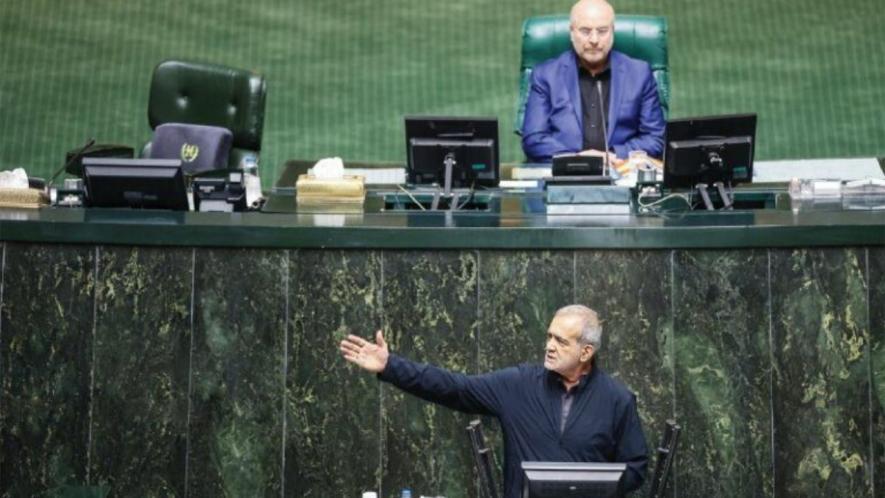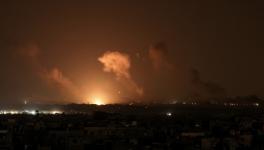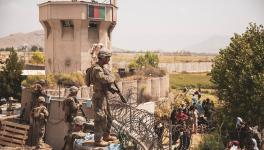Iran Will Hit Israel, Ball is in US-Israeli Court

Iran’s president Masoud Pezeshkian (forefront) secured vote of confidence from the parliament for the entire list of cabinet nominees, in a rare display of unity, Tehran, August 21, 2024
There is a Zen proverb — ‘If you want to climb a mountain, begin at the top.’ All the show of contrived enthusiasm by US President Joe Biden and CIA Director William Burns over a Israel-Hamas deal on Gaza war cannot obfuscate the grim reality that unless and until Israeli Prime Minister Netanyahu greenlights it, this is a road to nowhere.
But what did Netanyahu do? On the eve of the US Secretary of State Antony Blinken’s arrival in Tel Aviv on Sunday to press the flesh and cajole Netanyahu to cooperate, the latter disdainfully ordered yet another air strike in in the central town of Deir Al-Balah in Gaza, killing “at least” 21 people, including six children.
Biden had emphasised only the previous day that all parties involved in the Gaza ceasefire negotiations should desist from jeopardising the US-led diplomatic efforts to halt the war and secure a deal to return hostages and achieve a ceasefire to end the bloodshed.
And this was even after a ‘senior administration official’ who has been actively involved as negotiator — presumably, Burns himself — laboured to convey in a special briefing from Doha that the negotiations had reached an inflection point. The crux of the matter is that the Western leaders have a maximum pressure strategy toward Iran to exercise restraint while they don’t have the moral or political courage to tackle Netanyahu, who is invidiously undermining the Doha process because he is simply not interested in a ceasefire deal that may lead to his removal from power, investigation to pin responsibility for October 7 attacks, revival of court cases against him and possible jail sentence if convicted.
Indeed, Tehran is sceptical that peace cannot come to Gaza under American mediation but taking care not to create any new facts on the ground while the Doha negotiations are underway. Tehran has adopted a mature, responsible attitude not to derail the Doha process. The point is, Iran is keen that the horrific war that the Israeli state unleashed in Gaza must be somehow brought to an end. Over 40,000 people have died so far.
That said, Hamas’ response to the US’ “bridging proposal” at the Doha meeting will be a major determinant for Tehran. From available indications, there are serious disagreements over Israel’s continued military presence inside Gaza, particularly along the border with Egypt, over the free movement of Palestinians inside the territory, and over the identity and number of prisoners to be released in a swap. Both Israel and Hamas have signalled that a deal will be difficult.
On the other hand, the new Iranian government under Masoud Pezeshkian has highlighted his desire for a constructive engagement with the West and prioritises the removal of western sanctions. Pezeshkian’s nominee for the foreign minister Abbass Araghchi reiterated these policy parameters in his testimony at the Majlis on Sunday while seeking parliament’s approval for his appointment.
Dispelling speculations that Araghchi, a career diplomat who is reputed to be a moderate, may face difficulty to garner support in the conservative-majority parliament, the Majlis recognised his high professionalism by unanimously approving his name as Iran’s next foreign minister in a vote instantaneously.
There is much food for thought here for the strategists in the White House. Suffice to say that what Pezeshkian’s predecessor late Ebrahim Raisi left behind as his foreign policy legacy will continue to guide the new government. That signals a high level of national consensus. Succinctly put, in all these years since the 1979 Islamic Revolution, there has not been a more conducive setting in the power calculus in Tehran for a pragmatic engagement with the West. It will be extremely unwise for Washington to overlook the window of opportunity to engage with Iran.
On the other hand, Tehran’s grit to push back Western bullying is also at an all-time high level. The bottom line is that Iran will not submit to Western diktat. In today’s circumstances, therefore, it is unrealistic to expect Tehran not to react to the Israeli aggression of July 31. Iran’s sovereignty was violated and its response will be strong and decisive, — and as a deterrent for the future as well.
No amount of muscle-flexing by Washington will frighten Tehran. National unity, unlike in the US, is a crucial factor. The stunning endorsement by the Majlis of the entire list of cabinet ministers proposed by President Masoud Pezeshkian shows that there is no daylight between the different branches of state power. All indications are that Supreme Leader Ayatollah Khamenei and Pezeshkian are on the same page — and this message has gone down the echelons of policymaking and state power in Tehran.
The contrast with the disarray in Israel’s confrontational domestic politics couldn’t be sharper.
Therefore, Iran will do what it considers necessary and an obligation — and a matter of national honour. The Deputy Commander of the Islamic Revolution Guards Corps, General Ali Fadavi said on Monday, “We will determine the time and manner of punishment (of Israel). The usurping Zionist regime committed a great crime by assassinating Martyr Haniyeh, and this time it will be punished more severely than before.”
In a statement to The Wall Street Journal, Iran’s UN mission said any response must both punish the Israeli regime and deter future strikes in the country, but also “must be carefully calibrated to avoid any possible adverse impact that could potentially influence a prospective ceasefire.
“The timing, conditions, and manner of Iran’s response will be meticulously orchestrated to ensure that it occurs at a moment of maximum surprise; perhaps when their eyes are fixed on the skies and their radar screens, they will be taken by surprise from the ground — or, perhaps, even by a combination of both.”
The Iranian statement from the UN podium in New York is a message addressed to the White House that the ball is in the US-Israeli court. Interestingly, it coincided with the toned down White House readout on Biden’s call with Netanyahu on Wednesday, where Biden flagged the “defensive U.S. military deployments” and stressed the urgency of bringing the ceasefire and hostage release deal to closure and discussed upcoming talks in Cairo to remove any remaining obstacles.” It stands to reason that Tehran and Washington are communicating with each other.
Clearly, against such a heavily nuanced backdrop, the paranoia about a regional war is unwarranted, since neither Iran nor the US wants war. As for Israel, a small country, it simply lacks the capability to go to war with Iran armed with three submarines stacked with nuclear missiles as its strategic assets.
The stunning disclosure of Hezbollah’s vast network of underground missile network in southern and central Lebanon is a reality check for the Israeli political elite and settler communities on what they are up against.
As the former Israeli war minister Avigdor Lieberman puts it, Israel is engaged in a war of attrition, exactly as the Iranians wanted, having succeeded in uniting the resistance fronts. Lieberman pointed out that the agony of the indeterminate waiting for Tehran’s retaliatory operation is in itself an achievement for Tehran and the Axis of Resistance.
MK Bhadrakumar is a former diplomat. He was India’s Ambassador to Uzbekistan and Turkey. The views are personal.
Courtesy: Indian Punchline
Get the latest reports & analysis with people's perspective on Protests, movements & deep analytical videos, discussions of the current affairs in your Telegram app. Subscribe to NewsClick's Telegram channel & get Real-Time updates on stories, as they get published on our website.
























